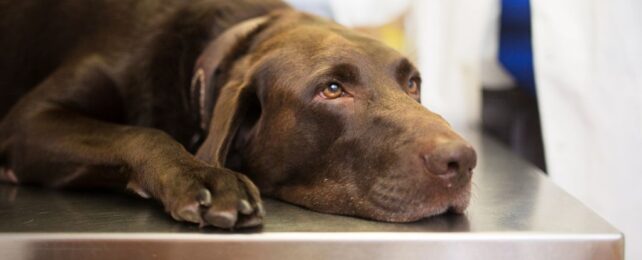Hundreds of dogs across the United States are falling ill with a mysterious respiratory infection the likes of which veterinarians have not seen.
Since mid-August, the Oregon Department of Agriculture (ODA) has received more than 200 case reports from veterinarians. Cases have also popped up in other states, like Colorado, Illinois, New Hampshire, and Nevada.
The illness seems to cause symptoms similar to kennel cough, such as nasal discharge, fever, lethargy, loss of appetite, or coughing, and yet it lasts much longer than is typical of canine respiratory infections, usually between six and eight weeks.
The illness rarely progresses to acute pneumonia, but in some extreme cases, it has led to death.
It remains unclear if all the cases reported across the country stem from the same contagious pathogen, and if that pathogen is a virus or bacterium.
According to officials in Oregon, antibiotics don't seem to work all that effectively against it, but it's possible that if it is a bacterium, it mutated in a way that resists common antibiotics.
The communications director of the ODA, Andrea Cantu-Schomus, told the American Veterinary Medical Association (AVMA) that "based on the epidemiology of the cases reported at this point, the cases appear to share a viral etiology, but common respiratory diagnostic testing has been largely negative."
Canine respiratory infections can be caused by at least nine different bacteria and viruses. While dog owners may be concerned by this newest illness, the ODA is advising "caution rather than worry".
Most healthy, fully vaccinated dogs are experiencing mild symptoms and are recovering fine.
If owners are still concerned, the ODA suggests the best way to protect against the contagious illness is to avoid dog gatherings, like dog parks, group dog training, or boarding facilities. Keeping your dog away from communal water bowls at cafes, parks, shops, or restaurants is also advised.
"We need to be logical and patient as those of us at the Oregon Veterinary Diagnostics Lab and colleagues across the country continue to work on this disease," the ODA director Kurt Williams told a local news station, Fox 12 Oregon.
"Please get your information from legitimate journalistic outlets, through scientific experts that have the expertise."
David Needle, a veterinary pathologist at the University of New Hampshire, told the New York Times that he and his colleagues have been researching the odd respiratory infection for about a year now. They are currently in the throes of testing samples from across the country to determine if these cases are all of the same origin.
If the disease is in fact caused by a pathogen, Needle explained to CNN, then it is likely to have been around for a while now. He says the recent outbreak is probably due to some kind of genetic mutation that increased the virulency of the microbe among canines.
If a pet owner notices their dog is experiencing potential respiratory infection symptoms, they should consult their veterinarian for further advice.
Canntu-Schomus says that "because of the broad spectrum of potential respiratory diseases, there is no one-size-fits-all recommendation, and working with a veterinarian is the best way to ensure that owners have accurate information that is appropriate for their situation."
